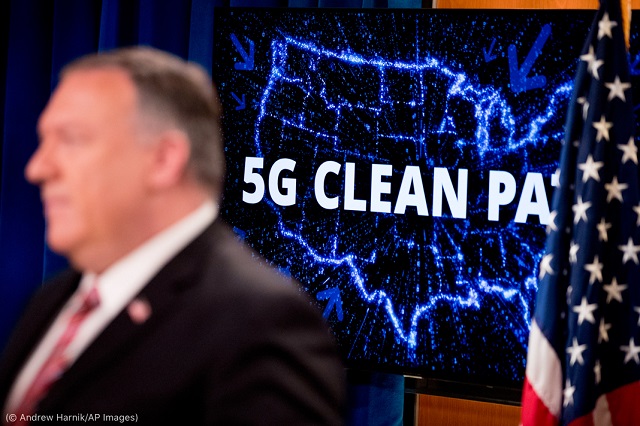Fifth-generation wireless technology is transformative and has the potential to reshape industries. From remote health care to self-driving cars, to critical services such as electrical grids and water systems, 5G has the potential to touch every part of our lives.
We need to be able to trust that 5G equipment and software companies will not threaten the national security, privacy or human rights of citizens and intellectual-property-rights holders.
That’s why the United States has a clear policy on 5G security and is working with countries to develop and build secure 5G infrastructure. By offering financing tools and technical expertise, the United States will enable countries to build their 5G infrastructure without relying on untrustworthy Chinese telecommunications firms or opaque and problematic Chinese loans.
The United States launched the Digital Connectivity and Cybersecurity Partnership to catalyze private sector investments in secure information and communications technology infrastructure and promote an open, interoperable, reliable and secure digital economy.
Launched by U.S. Secretary of State Michael R. Pompeo, this initiative is an inter-agency partnership between the U.S. Agency for International Development, the U.S. International Development Finance Corporation, the Export-Import Bank, the U.S. Trade and Development Agency, the Federal Communications Commission and others.
Under this initiative the U.S. government provides training and technical advisory support to help countries securely deploy 5G technology while also taking advantage of the tremendous economic opportunities enabled by increased connectivity.

Secretary of State Michael R. Pompeo on April 29 introduces the Clean Path Initiative to keep data safe and private. (© Andrew Harnik/AP Images)
The United States has warned countries about the danger of using equipment from untrusted vendors, including companies under the control of the Chinese Communist Party like Huawei or ZTE Corporation to build their countries’ telecom infrastructure.
In the People’s Republic of China, national laws compel companies to cooperate with PRC intelligence agencies, putting everything on a Chinese-built 5G network at risk. Unlike in the United States and other law-abiding nations, there are no independent courts in the PRC that companies can turn to in order to protect their clients from PRC requests for data.
Through its Clean Network Initiative, the United States works with countries to encourage them to use only telecommunications equipment from trusted vendors. The initiative is rooted in internationally accepted digital trust standards and is designed to address threats to data privacy, security and human rights from malign actors, such as the Chinese Communist Party.
The PRC government has been very aggressive in its support for Huawei and other PRC companies when it comes to building 5G networks. Beijing provides funding for Huawei and other Chinese companies and uses them as a part of PRC strategic foreign policy, according to the State Department.
These projects are “subsidized by the government with massive lines of credit and long-duration loans with generous grace periods from state-owned banks in order to undercut competition and penetrate foreign markets more deeply,” Christopher Ashley Ford, assistant secretary of state for the Bureau of International Security and Nonproliferation, explained in 2019.
The United States funds and supports developing countries’ efforts to build their 5G networks to ensure security and reliability.
DFC chief executive Adam Boehler said, “In developing countries where there are safe and trusted telecommunications lines, DFC and USAID bring financing and insurance tools that help lower the costs and mitigate the risks of American companies looking to do business in the region. The combination of these tools with a commitment to the Clean Network serves as a big catalyst for growth.”
Keith Krach, U.S. under secretary of state for economic growth, energy, and the environment, added, “The decision to join the Clean Network sends a powerful signal to the private sector that your country is a trusted partner and a great place to invest.”
Banner image: The United States is helping countries build secure 5G networks, which will change how people do business. (© Shutterstock)







COMMENTS0
LEAVE A COMMENT
TOP